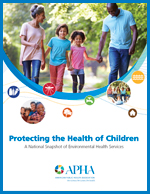Check out our "Protecting the Health of Children" report (PDF)

Why protecting our children’s health is so important
Young children often are hardest hit by the consequences of poor environmental public health systems. For their size, they breathe more air and eat more food than adults, making them particularly vulnerable to environmental public health hazards. And even low levels of toxic exposures can affect children’s physical and mental development.
While everyone suffers the consequences of environmental contaminants, communities of color and low-income communities are disproportionately affected. Historic and current-day policies and practices, such as structural racism, have led to and continue health inequities.
 "Protecting the Health of Children: A National Snapshot of Environmental Health Services"
"Protecting the Health of Children: A National Snapshot of Environmental Health Services"
Read the report (PDF). Recent environmental public health crises have raised concerns about environmental public health systems and how people can access essential environmental health services. With support from the W.K. Kellogg Foundation, the project Protecting the Health of Children: A National Snapshot of Environmental Health Services provides a snapshot of how accessible children's environmental health information and services are across the country.
Learn more about the report findings and recommendations by viewing our archived webinar.
National Scan
As part of the project, APHA identified 210 environmental health services that should be provided to children across the country. APHA collected feedback from subject matter experts and measured the accessibility of the environmental health services of 48 state health departments. The scan is helping shape recommendations for local, state and federal health departments to improve the sharing of environmental health information and services.
Community Profiles
In addition to the national scan, APHA visited two communities to discuss their understanding of and experiences with environmental health services. Community members spoke openly about how their children have benefited from services offered, and also about barriers they’ve faced in trying to obtain those services. APHA also interviewed local service providers to learn about their efforts to deliver environmental health services to children and families. The resulting community profiles are leading to recommendations for improving accessibility of children’s environmental health services.
"The barriers to accessing environmental health services are immense in this community. Not knowing the right agency, organization, the services, not even knowing that those services exist. With the Flint water crisis, there's still a lot of confusion regarding the parameters around accessing services… Unfortunately, everywhere you go in our community, there is a different barrier."
--Tamara S. Brickey, Public Health Division Director of Genesee County Health Department
Recommendations
The report recommendations aim to streamline and enhance information provided about children’s environmental health services to members of the community. The report's authors emphasize community engagement, coordination among agencies at multiple levels of government, more robust website content, sustainable funding and federal leadership for stronger policies to increase public awareness.
Coordinated, comprehensive and intentional efforts to reduce or eliminate environmental risks to children are a valuable investment in the health of children today and in that of future generations.
“We can have an environmental health system that protects our most vulnerable populations by working collaboratively among sectors; creating, updating and enforcing policies and regulations; and applying a health equity lens to our work.”
-- Kate Robb, APHA senior program manager, Environmental Health